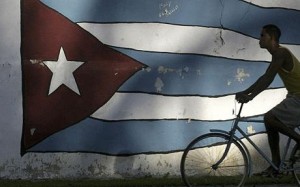 Miguel, married and with three children, used to work as a cook in a State enterprise. He would get up at three in the morning and undertake a trip of more than 12 kilometers and arrive early to work. He paid union dues and on two occasions was chosen ‘vanguard worker’.
Miguel, married and with three children, used to work as a cook in a State enterprise. He would get up at three in the morning and undertake a trip of more than 12 kilometers and arrive early to work. He paid union dues and on two occasions was chosen ‘vanguard worker’.
But his salary didn’t reach high enough to meet his economic needs. Sometimes more, sometimes less, Miguel took part of the food from the breakfasts of the other workers to sustain his family. Oil, rice, chicken, fish, eggs, meat, beans … he took what he could.
He had to assure the subsistence of his family. On occasion, very discreetly, he’d sell in his neighborhood some of the things he used to steal. With that extra money he used to cover other expenses. His kids needed clothes and shoes, things that are only sold in hard-currency-only stores; hard currency that he couldn’t earn because his salary was paid in pesos.
Somebody informed on what Miguel was doing. He was fired from the center. And because it was the first time, the court sentenced him to six months’ deprivation of liberty for the crime of larceny. He had to work in a correctional facility in agriculture.
In the sentence they didn’t take into account the motives that led him to commit what is called in good Cuban “robbery”. From his new location, when he’d leave on a pass, he’d continue taking food for his house.
Before 1959, in the Cuban Penal Code existed the character of the “family larceny”; a circumstance which, in some cases, exempted the actor of penal responsibility, and in others, diminished the sentence. It was taken into account when a person — hungry or indigent — took objects necessary for his survival and those people in his care.
“Revolutionary justice” eliminated this character of penal law. The supposition was that the government of the bearded ones attended to the needs of all equally. Supposedly, vagrancy, unemployment, mendacity, and vices and causes of misery had all been eliminated.
Seen in this way, this character was unnecessary in the new Penal Code. For socialist legislation, no citizen in the newly created conditions had any extreme necessity which would compel him to steal. It was assumed that Cuba was a nation in which all its citizens enjoyed opportunity and the right to work.
It is ironic that in actuality it should be precisely the ‘proletarian’ class which finds itself in a state of necessity such that it sees itself obliged to swipe the State’s resources to survive and maintain a family. It is one of the social problems that affects the national economy the most and that the government confronts as a “fight against illegality”.
What’s certain is that the justice applied by socialist society is interested more in punishment to set an example than in forgiving a criminal fact committed out of necessity. Fifty-two years later, experience demonstrates that the revolution has been incapable of attending equally to the needs of the population.
Laziness and destitution have increased and bribery and corruption have gone sky high. It remains proven that full employment, by itself, is insufficient to make misery disappear, and with it, the commission of “family larceny”.
Miguel’s story repeats daily in many Cuban families. You can count on different forms and with other people. But the reality is singular: the critical economic situation that has swept the nation for decades has led the majority of workers with labor ties to the State to convert the “swipe” into a way of life indispensable to survival.
Translated by: JT
March 10 2011
